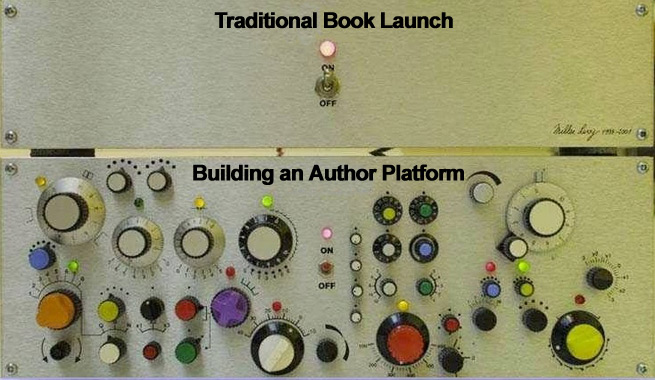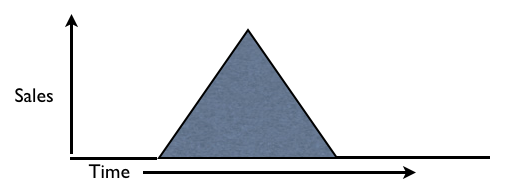I spent the past week meeting dozens (hundreds?!) of writers and publishing insiders at two events:
- Writers Digest Conference
- Digital Book World
These were days filled with learnings and inspiration, and have left me considering how it is that a writer takes the reins of their own career – to shape their own destiny of creating and sharing their work. I had such a great time at these events, and spoke at four sessions:
Today, I want to talk about ways that you as a writer can shape your career. How to stop wondering about the future of publishing, how to stop waiting for someone to answer your query letter – how to begin to not just work TOWARDS a writing career, but to actually experience it.
One thing was clear at both of these events – people are getting very serious about embracing the business side of publishing – to ensure that there is a vibrant future for writers and publishers in the print and digital domains. Authors were actively discussing marketing tactics and the business of publishing – publishers and other insiders were reviewing reams of data to understand the marketplace and find opportunities.
The centerpiece of the Writer’s Digest Conference was a “Pitch Slam” where writers would be able to pitch their books to high profile agents. This was a very cool event, and an engrossing site in so many ways.
Hundreds of writers waited to be let into the Pitch Slam room. I watched them practice their pitches the previous day and that morning – this was a huge opportunity for each of them to get feedback from professionals, and perhaps even find an agent who wanted to work with them. As you approach the room, this is the middle of the line:
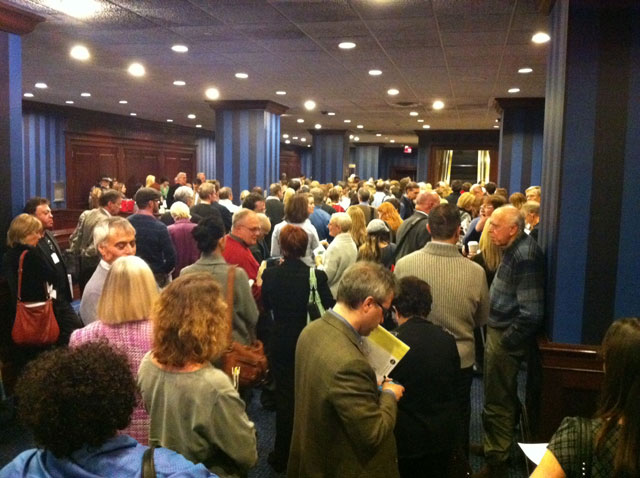
And here we are at the front of the line:

Finally everyone is let in. I found it really symbolic how thin the doorway was, compared to the size of the crowd waiting to squeeze through it, and even the size of the room inside. As if there is not enough room for everyone to become a successful writer.
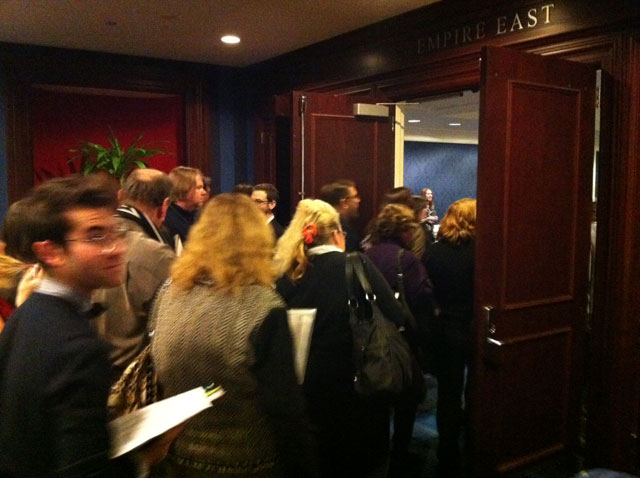
Here we have it: authors in organized lines waiting for their 90 seconds to pitch the agents who are seated. This is incredibly difficult for both the writers and the agents, yet at the same time, a rare opportunity for both:

This really floored me: that invisible line separating the writers (on the right) and the agents (on the left.) A barrier to reaching their dreams, to reaching readers.
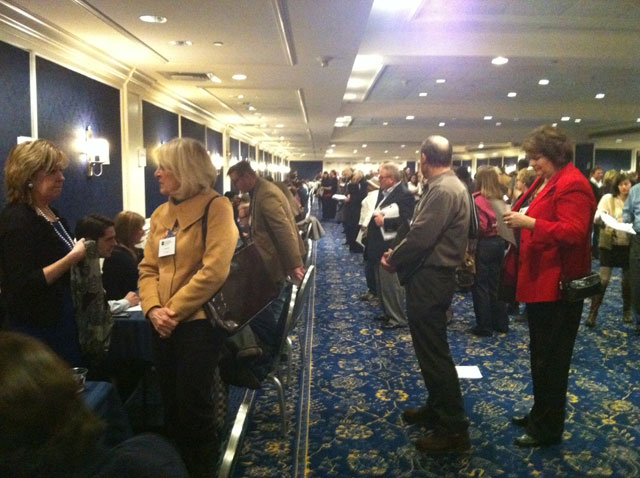
This was such a great event, and I spoke to many writers who had been preparing for months for this moment.
So my question is: what ELSE should a writer be doing to build their careers? Once you have gone home from the Pitch Slam, once you are back in your day-to-day routine, how do you turn that dream into a reality while you wait for the phone to ring? And taking this one step further… what should writers be doing that will help them if an agent actually does take them on. How can the author help their book do well?
This is the thing: writers are waiting to connect to gatekeepers, when the gates to their audience no longer exist as it once did.
Of course, the role of agents and publishers is AS IMPORTANT as ever, if not more so. But, along WITH them, there are so many other things a writer can be doing to build their career. There are ways that writers can access readers, build a fan base, and nurture that process, all on their own. Imagine how much more successful your books can be if you are doing this IN ADDITION to working with agents and publishers.
Anyhow, the following tips are what I have come away from the conference thinking about.
Choose Your Identity
In the past several days, I heard publishers, agents, authors, and everyone in between discuss issues surrounding publishing. The digital revolution has provided many opportunities and many challenges, but inherently, they have each left us with questions about identity. What is the role of an agent? Is an author also a marketer? Do you need a traditional publisher?
If you are going to be a writer, my advice is this: be a writer. Don’t wait for the validation of a publisher or agent in order to change your identity from hobbyist to author. Decide who you want to be, then embrace it. They say acceptance is the first step to the road to recovery. I also think it’s the first step to the path of success. If you are going to wait for the world to validate you before you truly embrace your identity as a writer, then you will find too many reasons to never give it your full effort. And with that, you run the risk of never truly being a writer, because you have yet to commit 100%.
This is not one bit about diminishing the role or value of agents and traditional publishers. It is about the primary reason most people do not pursue their dreams of being a writer. That they are there own worst enemy – the only person stopping you is you.
I’ve heard story after story from creators – that they never finished their great novel, because they didn’t get a big advance from a publisher; that they gave up music entirely because their music label dropped them; that they don’t have time for their art, because they have to mow the lawn.
As I write this at 4am, I can’t help but feel that we are not faced with a lack of time, but a need to prioritize. That the drive to create a body of work lies not in others allowing us time, but in the motivation to realize our purpose as writers and creators.
Embrace All Aspects of a Writing Career: Art, Craft, and Business
If you are a writer, is it an art, a craft, or a business? If it is a mixture of all three, where do you draw the lines in your own writing career?
Perhaps the lines shouldn’t be drawn too firmly. Again and again, I am hearing people in publishing talk about the need for writers to build their fan base, to begin marketing their expertise and passion before they have even finished their book. That their work as a writer is a combination of art, craft, and business, and each needs to evolve in tandem. That if you spend years collecting ideas, but not honing your craft, then you will hit a wall. That if you spend years honing your craft, but not establishing a fan base, then you will hit a wall.
These things work together to build a career: the art, craft and business aspects of your writing. You can’t put off one of them for years, hoping that magically you can tack on a solution at the last minute. Balance your focus – because this is not just about creating a work, it is about building a sustainable career – one in which you interact with readers and build a fan base over the course of years and decades.
I remember walking through one house my wife and I were considering purchasing awhile ago. There were photos on the wall of magazines that the owner – a writer – had been published in, and covers from the book he had published. And it clearly represented a creative time period of their life that took place in the early 1970’s.
While I was impressed at their accomplishments, I had wondered why there were no works posted from the past 3 decades. Why was there not sustained career growth over the course of a lifetime, instead of a mere blip in their career as a writer?
I don’t know the answers to that one person’s story, but I imagine that at some point, they stopped evolving their art, their craft, or their business experience in publishing. And all three are essential to be engaged with in order to grow.
Take Action
Here we are in the publishing world, with writers and publishers and everyone in between considering the path forward.
But there is no established path anymore.
However, there is a choice. To cut your own path.
To take personal responsibility to shape your identity.
To make choices based on your personal goals.
To create a foothold for your own career, rather than simply wait until you are magically ‘discovered.’
Take the reigns. Don’t wonder what will happen when OTHER people act on your behalf.
Arm your self with the tools and connections to make it happen. Not as a negative – a reaction. But a positive – an action.
It’s too easy to feel that we could move forward if we only had that ONE missing puzzle piece. Find that missing piece you need.
Structure Your Learning
Why does the Weight Watchers program work? Points, meetings, and accountability. They create a structured system that makes you accountable to YOURSELF, and does so by connecting you with other people each week. There is no hiding in the Weight Watchers system, the points don’t lie, and if you miss the meetings, then you aren’t really in the program. Standing on that scale in front of other people is a critical part of why it works.
Find a way to learn the skills you need – regardless of the fact that you likely have no spare time. There will NEVER be time. We are all balancing family, work, home, hobbies, a social life, and other obligations. And yet, some make the time to build their writing career, and others will only dream of having one. Structuring the process by which you build your career is a key way to ensure it actually happens.
This is not just about learning, it is about executing. That you need to not just PLAN, but you need to DO.
Likely, you need to build a platform for your career – to establish the skills you need that always give back. The skills of surfacing creative ideas, skills of honing your craft, and skills of connecting with the communities and marketplace that your work speaks to.
There are a variety of ways to do this. I am offering one way to do this – an online course for writers to Build Your Author Platform. Maybe this course is for you, but maybe it isn’t. The fact is, there are plenty of other course, writing groups, coaches, workshops, and ways to structure your writing career. Find one that works for you.
Make a choice – make a commitment. Involve other people in this process. Don’t work for a decade on your novel before you show it to anyone – before you get your first glimmer of feedback, before you engage your first fan. Do it now. The only thing stopping you is you.
Why do I say you should get off the sidelines of your writing career? Because we all have to realize that there is no coach who is going to let you in the game. It’s just your initiative that does it. Others will undoubtedly help you along the way – but don’t wait for it – earn it.
Let me know how I can help. Thanks.
-Dan



